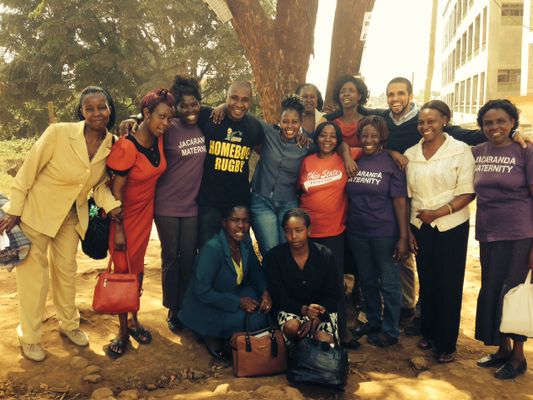Every day 800 women die from preventable childbirth-related illnesses. Most of these deaths occur in sub-Saharan Africa where four out of five unattended births take place. It was stats like this that got me excited to spend this summer working forJacaranda Health, an innovative chain of maternity health clinics in Nairobi, Kenya. Hearing so much about the painful problem, I wanted to be a part of the solution.
After spending time in the Peace Corps in Uganda, I knew I wanted to work again in East Africa following the completion of my MBA at Duke’s Fuqua School of Business. Through a summer fellowship with theInternational Partnership for Innovative Healthcare Delivery (IPIHD) and the Social Entrepreneurship Accelerator at Duke (SEAD), I spent 10 weeks conducting strategic analysis to support the design and launch of new services at Jacaranda.
Jacaranda Health embodies a bold vision: providing affordable, customer-centered delivery services for low-income women that might otherwise die during childbirth. Jacaranda is designed to help the woman understand that she has value, that she can receive high quality, comfortable care and most importantly that her baby and her life matter tremendously. Jacaranda has developed a model of care built on global best practices that leverage midwifery, innovative technologies and patient-centered design. Saving mothers and babies through smarter clinic design and practices – what a great way to use my MBA.
During my fellowship, I’ve had the unique opportunity to not only experience Jacaranda’s culture, customer service and incredible success rate with patients, but also to watch a thriving model continue to grow and receive more national recognition, saving even more babies and mothers. For low-income women in Kenya, the biggest barriers to receiving care are limited ability to pay for delivery services and proximity to quality care. This summer Jacaranda made significant progress on both for low-income women in Nairobi.

John with community mobilizers that educate women on safe maternal health practices
The cost of a matatu ride to the Jacaranda clinic, the delivery, the inpatient stay, the food, the medicine – it all adds up. But this summer, Jacaranda received accreditation by Kenya’s National Health Insurance Fund (NHIF), which means that the cost of delivery and medicines are now largely covered by the government. Jacaranda also opened its second clinic this August, squarely situated in the heart of Kahawa West, a very densely populated Nairobi suburb. This year, Jacaranda provided hundreds of deliveries to low-income women across Kenya, providing high quality of care for less than $10 per birth.
While I’m heading back to the US to start at Deloitte in several weeks, I’ve enjoyed this summer tremendously because I’ve learned a lot about the complexities of providing healthcare in the developing world. I have been able to witness the impact of the free maternal healthcare policy instituted by Kenya’s president, only to discover what “free” maternal care in the public sector really meant. Through my discussions with pregnant women who insisted they were going to deliver from their homes, rather than seek free care at a public clinic, my eyes were opened to how they saw the world.
The work Jacaranda is doing will not only impact the thousands of women they serve but also how I view the world the rest of my life. Ten dollars to save a life. I couldn’t be more impressed.
John also created a video about his experience working with Jacaranda. Clickhere to view.

John in front of Jacaranda’s new facility in Kahawa West

